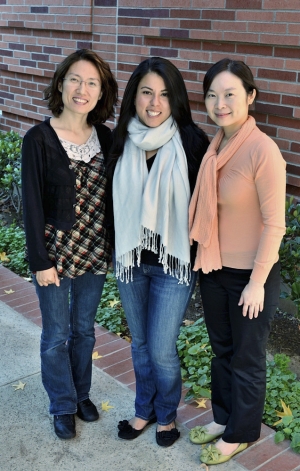Team Helps Mexican Workers and Korean Managers Improve Work Relationship
January 23, 2012 / by Eric Lindberg- Research
Cramped in poor working conditions and dispirited by the austere approach of their employers, workers in a Mexican garment factory were struggling with high levels of work-related stress. Their Korean managers, concerned about the productivity of the factory, felt the workers socialized too much and, due to cultural misunderstanding, perceived them as having a lazy mentality.
By the time a group of doctoral students from the USC School of Social Work arrived to assist faculty researchers with a study on communication and production processes, productivity had slowed to a crawl and discord between employees and managers had caused morale to plummet. The factory seemed to be destined for closure. It would have been a serious blow to the small Mexican town, which derives much of its livelihood from the manufacturing plant.
“If this factory isn’t functioning, everyone is out of work,” said Erica Lizano, a member of the student team that began working on the research project in 2008.
Led by Michàlle Mor Barak, a social work professor at USC, and several researchers from the USC Marshall School of Business, the study sought to address challenges in workplace management, cross-cultural miscommunication and productivity. With funding from one of the factory’s contractors, a large U.S.-based sportswear company, the research team hoped to improve cross-cultural relationships and implement Lean production processes made famous by the automobile manufacturer Toyota.
“The students were involved at each and every stage of the process,” Mor Barak said.
Using information gleaned from a series of initial interviews with workers and management, Lizano and her fellow PhD students—Hsin-Yi Hsiao, Ahraemi Kim and Min-Kyoung Rhee—began outlining areas of conflict.
Rhee, who is fluent in Korean, found that managers seemed most excited about implementing the new manufacturing process, which emphasizes efficiency and teamwork. In contrast to feedback from workers, they felt they had a solid understanding of Mexican culture.
“I could see there was a cultural miscommunication or misunderstanding,” Rhee said. “I think one of the key elements in the study was the cross-cultural piece.”
Lizano, a native Spanish speaker, noted workers found their Korean managers particularly distant. Poor balance between work and family life also had a negative effect on workers, who reported having little flexibility in terms of family leave or vacation.
“One of the workers mentioned she had to leave her 8-year-old daughter at home alone,” Hsiao said. Few top managers spoke Spanish, she added, further complicating their relationship with employees.
Through training sessions that brought together managers and workers, the intervention team began addressing issues of workplace inclusion, stress and cultural communication. Despite some struggles at first, the students and other researchers quickly became adept at translating among three languages and improving exchanges between management and employees.
“Being together in the cultural training session, they kind of naturally realized the similarities and differences in their cultures,” Rhee said.
Workers realized their bosses in middle management also had to deal with work and family imbalance, as they also received limited vacation time and had few chances to travel home to Korea.
Other misunderstandings were resolved, such as a conflict between workers and one Korean manager in particular. Workers felt he rarely smiled and was blunt in his interaction with employees, causing them to feel intimidated, as well as concerned for his well-being.
“He was pretty moved by [their concern]. He didn’t know they felt that way,” said Rhee, adding that as a result of the emotional connections he made with the workers during the training, the manager made a concerted effort to be less intimidating and more friendly toward workers.
Production changes also had a positive impact on efficiency and morale at the factory. Instead of working on a typical sweatshop assembly line, with their backs to each other and surrounded by heaps of excess material, the workers clustered in teams and worked together in a neater environment, improving the flow of production and reducing waste.
In qualitative interviews following the cultural and Lean training sessions, Lizano said workers felt productive, more integrated as a team and increasingly empowered to make suggestions to their managers without fear of reprisal. She was particularly surprised they embraced stress management techniques such as mindful breathing and dance.
During the 18-month study period, the student team traveled to Mexico four times and stayed in modest dormitories at the factory. Despite the occasional lack of hot water and meager lodging, Mor Barak said the students remained professional, astute and helpful.
“We couldn’t have done it without them,” she said. “They were willing to work anytime, anywhere.”
With data collection completed, the team is focused on publishing and presenting their results at academic conferences. In particular, they are encouraged by the positive response to cross-cultural training and believe it to be an effective buffer against work-related stress in the garment production industry.
The doctoral team also noted the results underscore the growing importance of the social work profession in promoting social and economic justice for vulnerable populations around the world. This is particularly critical in Mexico’s sweatshop industry, which employed an estimated 1.2 million workers in 2006 and is notorious for poor working conditions. As large international corporations begin to shift toward corporate and social responsibility, the student team feels that social workers are uniquely positioned to develop and support the movement.
To reference the work of our faculty online, we ask that you directly quote their work where possible and attribute it to "FACULTY NAME, a professor in the USC Suzanne Dworak-Peck School of Social Work” (LINK: https://dworakpeck.usc.edu)
